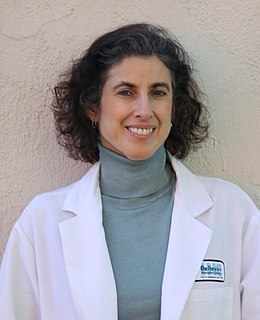A Quote by Feng Zhang
Studies by many labs have already started to identify specific circuits of neurons involved in normal cognitive function like memory and learning, as well as disease processes such as Parkinson's disease, depression, and autism.
Related Quotes
To be brutally honest, for much of that time, I was the only person in the world with Parkinson's. Of course, I mean that in the abstract. I had become acutely aware of people around me who appears to have the symptoms of Parkinson's disease, but as long as they didn't identify with me, I was in no rush to identify with them. My situation allowed, if not complete denial, at least a thick padding of insulation.
The well-being of a neuron depends on its ability to communicate with other neurons. Studies have shown that electrical and chemical stimulation from both a neuron's inputs and its targets support vital cellular processes. Neurons unable to connect effectively with other neurons atrophy. Useless, an abandoned neuron will die.
When a patient tells a doctor that every symptom is the most horrible ever - and the physical exam and labs are normal - we often suspect something psychological is going on. The symptoms aren't fake. They're physical manifestations of anxiety, depression, and stress. So while I'm always on the lookout for a serious underlying disease.
When my disease nearly destroyed me in 2009, my doctors thought I'd be lucky to regain 80 percent of my cognitive abilities. When I was at my sickest, I couldn't read or write. I could barely walk on my own or groom myself. The disease felled me physically and mentally - robbing me, briefly but intensely, of my wits, my sanity, my memory, my self.
ACT psychology is a psychology of the normal. A lot of the psychologies that are out there are built on the psychology of the abnormal. We have all these syndromal boxes that we can put people in and so forth. The actual evidence on syndromes is not very good. There's no specific biological marker for any of the things that you see talked about in the media. Even things like schizophrenia - there's no specific and sensitive biological markers for these things. There may be some abnormal processes involved, but vastly more of human suffering comes from normal processes that run away from us.
It seems The Journal of Neurology reports that the longer you smoke, the less likely you are to develop Parkinson's disease. So what are they telling us? Follow me guys. Remember, a couple of months ago, doctors said drinking a glass of alcohol every day was good for your heart. Smoking prevents Parkinson's disease. Marijuana is good for glaucoma. Sex is good for your prostate. You know, screw health care. Let's party!
People still think of AIDS as a shame-based disease, it's a sexually transmitted disease, and you're either gay or you're a prostitute or an intravenous drug user. And so a lot of people are still very bigoted about this disease. It's such a treatable disease. It's so - the end is in sight for this disease, medically.
































